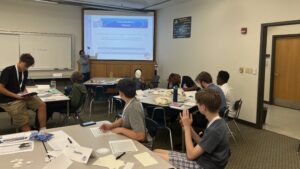
As seen in SEEN Magazine, Issue 19.2, Winter 2018
Science, technology, engineering and mathematics (STEM) education is at the forefront of national and regional education agendas. A strong foundation in STEM education for K-12 students is critical for the country’s continued success in a globalized economy. So, how can we best prepare K-12 students for STEM-related careers?
“The answer is effective interdisciplinary STEM professional development for educators,” says Jennifer Albert, Ph.D., director of the STEM Center of Excellence at The Citadel.
“In order for K-12 students around the country to be successfully prepared to compete in our workforce and enter the thousands of unfilled STEM jobs, educators must be well-equipped with the tools necessary to teach STEM content in an authentic and integrated way.”
For teachers in the classroom and educators working in informal schools such as museums and aquariums, the solution is an advanced degree program that integrates STEM disciplines in a holistic fashion.
Here are three reasons that it’s time to think about pursuing an advanced degree in STEM education:
1. You want to prepare tomorrow’s STEM workforce today
According to a 2017 update on STEM jobs from the U.S. Department of Commerce, there were an estimated 9 million STEM professionals in the United States in 2015. Over the last decade, employment in STEM occupations grew much faster than employment in non-STEM occupations. Also, STEM occupations are projected to grow by almost 10 percent from 2014 to 2024, compared to only 6.4 percent growth for non-STEM occupations.
Many middle and high school students are noticing the great demand for STEM jobs. Despite their interest, however, the American College Test reports that out of the 48 percent of high school graduates taking the ACT who expressed interest in STEM-related careers, only a quarter met and exceeded preparedness benchmarks.
The National Science Board ranked highly effective teachers as one of their top priorities in ensuring quality STEM education. There is a critical need to build STEM literacy in schools across the nation to benefit the future of society. According to the Bureau of Labor Statistics, more than half of the economy’s fastest growing jobs require significant training in one or more STEM disciplines, and 62 percent of all jobs today require STEM skills.
Effective and talented educators, both formal and informal, are needed to pique the interests of K-12 students in ways that encourage them to successfully pursue careers in STEM fields through contemporary lessons. The coursework found in the Master of Education in Interdisciplinary STEM Education program at The Citadel is designed to assist educators teaching STEM subjects and to provide them with the means to teach STEM content in more effective and innovative ways.
2. You want to teach through integrated approaches
There have been many discussions in the academic world that suggest STEM education is best approached through interdisciplinary methods. Educators who incorporate integrated and relevant STEM material into lesson plans that help students solve real-world problems are in demand. Proper and up-to-date professional development for STEM teachers makes it easier for students to understand the interdisciplinary nature of STEM and how their skills can transfer to different disciplines.
The M.Ed. program at The Citadel is devoted to the development and practice of 21st century instruction as it relates to STEM content knowledge. Core coursework and electives in the program include developing STEM disciplinary literacy skills, the chemistry of art, and multidisciplinary experimental design and implementation. The program is designed primarily for current middle and high school educators of the STEM disciplines seeking advancement of their skillset. Educators of informal educational centers are also welcome to pursue the degree program. While the degree does not lead to a certification, it was developed with the mission to improve teacher effectiveness in STEM education.
A graduate successfully completing this degree program will be skilled at creating relevant projects for use in the classroom and utilizing project-based instruction to effectively engage their students in fields of science, technology, engineering and mathematics.
3. You appreciate the convenience of online education
Online education has taken the higher education sector by storm mostly due to its asynchrony and other advantages for the busy, yet education-minded student. The number of four-year colleges offering online courses of study has increased significantly over the past decade and continues to trend upward due to the value-added benefits for students and institutions alike.
The M.Ed. program at The Citadel is unique compared to similar programs in that it helps educators to incorporate all of the STEM disciplines in an online environment. The program was designed for teachers to be highly effective in their sharing of STEM content knowledge to yield higher rates of K-12 student career readiness and success in the 21st century.
The Citadel’s Master of Education in Interdisciplinary STEM Education is a 34-credit hour online degree program designed for formal and informal educators. The goal of the program is to create 21st century STEM educators and leaders by facilitating a broader understanding of the interdisciplinary nature of STEM, a deeper knowledge of discipline-specific content, and new integrated approaches for the teaching and learning of STEM content.

 The Citadel’s STEAM Camp takes students on a space adventure with hands-on learning
The Citadel’s STEAM Camp takes students on a space adventure with hands-on learning Newest program from The Citadel STEM Center aims to support math education leaders in rural areas
Newest program from The Citadel STEM Center aims to support math education leaders in rural areas Space and cyber: The Citadel STEM Center to offer local students two unique summer learning opportunities
Space and cyber: The Citadel STEM Center to offer local students two unique summer learning opportunities


